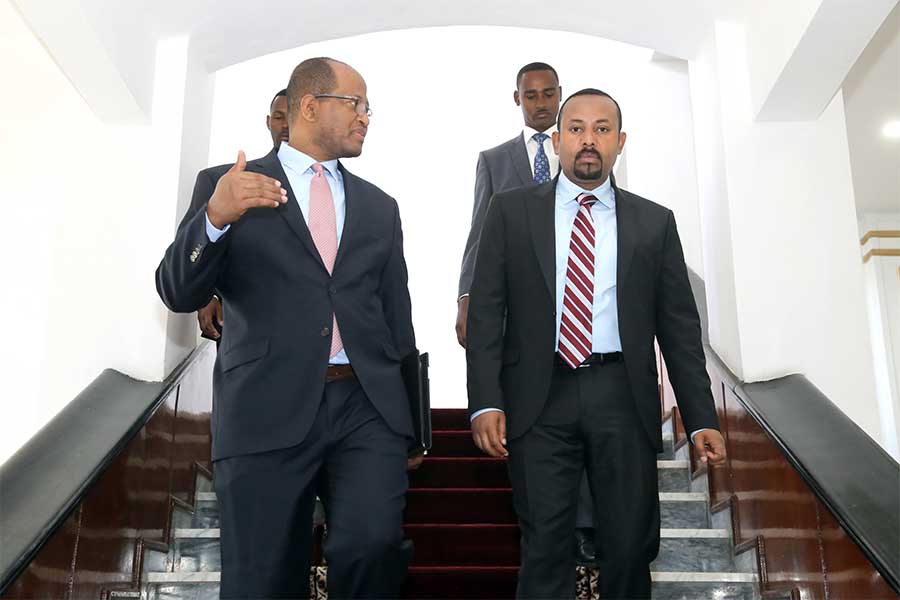
Fortune News | Oct 26,2019
Ethiopia’s economic reform negotiations with the International Monetary Fund (IMF) are in their fourth round, taking place in Washington, D.C., against the backdrop of joint meetings with the World Bank and the IMF. Despite having met three times in the past two years, the discussions have yet to resolve “differences” over economic reforms, which the IMF deems essential for advancing loans. The Ethiopian delegation, including Finance Minister Ahmed Shed, State Minister Eyob Tekalegn (PhD), Central Bank Governor Mamo Mehiretu, and Senior Monetary Policy Advisor Teklewold Atnafu, is facing IMF demands for more flexible and market-determined exchange rates. (In the picture: Ethiopian officials meeting representatives of the Paris Club creditors).
Alvaro Piris Chavarri, the IMF’s mission chief for Ethiopia, said last week that although negotiations continue, the gap between the parties persists. “There are still differences,” Chavarri said at a press briefing, voicing cautious optimism about reaching a consensus. He acknowledged that “discussions are time-consuming” but declined to confirm any specifics about potential financial packages, despite reports of a 3.5 billion dollar loan package. High inflation and severe foreign currency shortages compound Ethiopia’s economic challenges, pressuring the authorities to possibly devalue the Birr. The official exchange rate is notably misaligned with the parallel market, where the Birr trades approximately 50pc weaker against the U.S. dollar, inching to 58 Br late last week. The economic strain led Ethiopia to default on its international debt in December last year, marking it the third African country to do so within three years. The default has heightened the urgency of the ongoing negotiations. Ethiopia has been off the IMF’s funding radar since 2020, after the last lending arrangement of 2.9 billion dollars veered off course in 2021 after a civil war broke out in the north. The country also seeks to consolidate its post-civil war recovery efforts, following a peace agreement signed with the TPLF in Pretoria, South Africa, in November 2022.
Ethiopia is also negotiating with the World Bank for about 3.5 billion dollars in support. According to a Western diplomat familiar with the talks, who spoke to Reuters, Ethiopia’s leaders plan to secure three billion dollars through debt restructuring. The potential financial influx is critical as the country looks to stabilise its economy and address structural issues. A spokesperson told Reuters last week that the World Bank, optimistic about the eventual impact of these negotiations, is still working out the details of subsequent phases. A statement by the Ministry of Foreign Affairs said last week that the talks with the Bretton Wood institutions intended to underpin Ethiopia’s ambitious economic program, which includes liberalising the market and correcting foreign exchange distortions.
PUBLISHED ON
Apr 20,2024 [ VOL
25 , NO
1251]

Fortune News | Oct 26,2019

Dec 22 , 2024 . By TIZITA SHEWAFERAW
Charged with transforming colossal state-owned enterprises into modern and competitiv...

Aug 18 , 2024 . By AKSAH ITALO
Although predictable Yonas Zerihun's job in the ride-hailing service is not immune to...

Jul 28 , 2024 . By TIZITA SHEWAFERAW
Unhabitual, perhaps too many, Samuel Gebreyohannes, 38, used to occasionally enjoy a couple of beers at breakfast. However, he recently swit...

Jul 13 , 2024 . By AKSAH ITALO
Investors who rely on tractors, trucks, and field vehicles for commuting, transporting commodities, and f...

Jun 28 , 2025
Meseret Damtie, the assertive auditor general, has never been shy about naming names...

Jun 21 , 2025
A well-worn adage says, “Budget is not destiny, but it is direction.” Examining t...

Jun 14 , 2025
Yet again, the Horn of Africa is bracing for trouble. A region already frayed by wars...

Jun 7 , 2025
Few promises shine brighter in Addis Abeba than the pledge of a roof for every family...